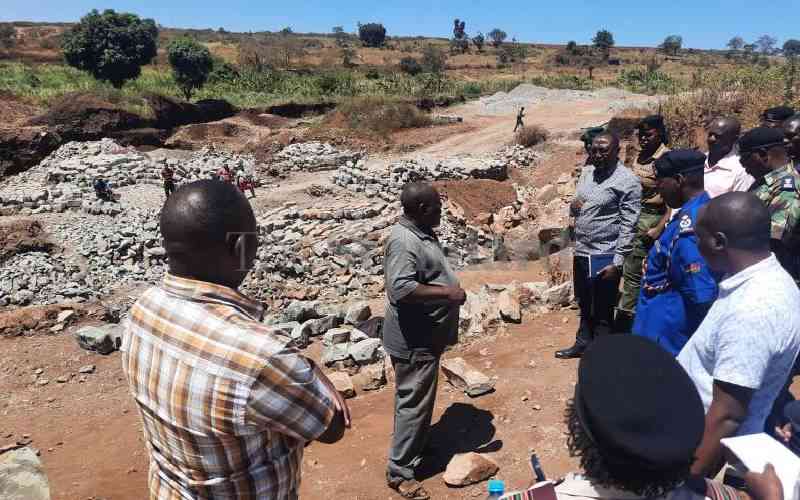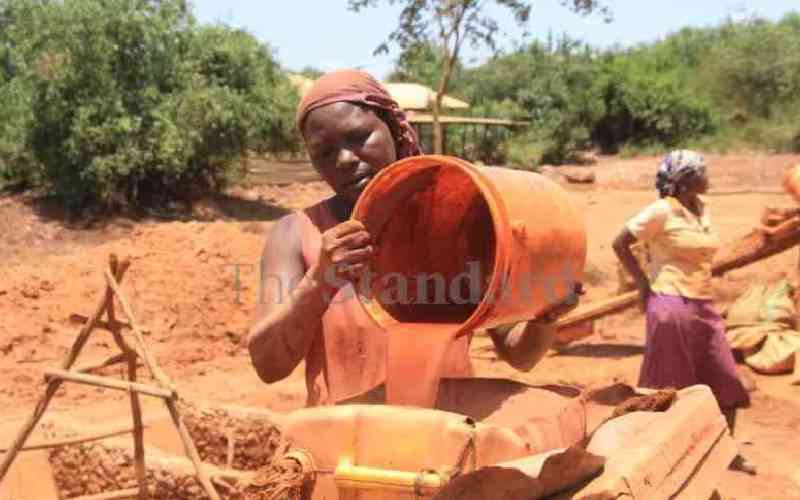By Jenny Luesby
Kenya: It, by-and-large, has escaped the attention of the media that Kenya has a resources asset far greater than the oil and gas find, about which there was so much fuss. Down in Kwale, under a wooded hill, sits a deposit of Rare Earths that is of global significance.
Rare Earths are in every mobile phone, in our modern light bulbs, in most modern technologies, and just as the world played a dance of Middle Eastern supremacy over oil and control of oil supplies, so China, more than a decade ago, spotted the power of controlling the Rare Earth market.
Rare Earths
The Chinese President laid out his country’s strategy to be the controller of Rare Earths as the Middle East had controlled oil. He spoke of it. It was spelt out in his speeches. And China moved. With large Rare Earth deposits of its own, it went on to acquire almost all of the world’s mines, in Australia, globally.
It secured more than 95 per cent of all the world’s Rare Earth supplies. No-one can make modern technology without Chinese-controlled Rare Earths, and, predictably enough, the prices have soared in recent years.
Now, Kenyan geologists have long known the country had Rare Earths, together with a handy little mineral called Niobium, also these days in big demand as a strengthener of steels. Geological surveys showed the Rare Earths in Kwale back in the 1950s — a sweet enough mineral asset to mean there was a time that global mining major, Anglo American, hacked a mine shaft into that hill and set out on the path of mining there.
But that international company gave up, unable to get mining go ahead in a country where mining has never happened NOT because the country isn’t packed with mineral resources, but because no mining company could ever manage the politics. Mining takes huge up-front investment.
The surveys have to happen first, the mining, the processing plant, the processing, and finally, years down the line comes the first actual piece of revenue.
Investors have to back a mine, for years and in very large sums, to turn it into a revenue stream.
It’s not like selling Coca Cola, and it doesn’t work when the menu on offer is ‘put a lot of money in, but you may lose it all and never see a penny of revenue’. Mining investment takes SOME commitments.
Kenya has never offered that, leaving itself almost isolated in Africa as a country without earnings from natural resources.
But the Kwale thing was bigger still. It certainly sat there for decades undeveloped through a lack of will to convert into a government facilitated investment. A French company tried after Anglo American. Gave up.
Then a little ‘junior’ mining company — first a South African/Australian nexus, then merged with a Toront-listed mining company — began the journey.
That company got further than the others. They prospected and found the deposit was among the richest in the world, possibly the richest, in the percentage of Rare Earths held in the soil.
Stay informed. Subscribe to our newsletter
They also found that the deposit was larger than anyone realised. It now looks as if it may be the second largest in the world, after the world’s largest Rare Earth mine, in China, called Baotou.
But by now, there were more challenges than ordinary, routine, forever, political blockage of mining.
No one ever mentioned in China’s strategy for Rare Earths that it would be a supply dominated by China AND Kenya. The ‘Kenya’ part wasn’t in the global plan.
Not that anyone has really focussed on that jigsaw puzzle as we gained lots of lovely grants and friendship from China, a free hospital, a beautiful Thika superhighway.
I asked a Chinese First Secretary last week why China had put so much into Kenya recently, and he told me, repeatedly, that it was a ‘beautiful’ country with interesting tourism and great weather.
So I guess China will be putting a lot into Croatia too, with its stunning coastline.
Of course, the truth is, China wanted that mine, and maybe it’s suicidal of me to say this, but I think they had got it. Only then our new government was elected, and within three weeks our new President intervened, personally. He met the international miners, he issued their licence, and they have now received their Environment Impact Assessment approvals. The fund raising is underway.
Changing future
And no-one, but no-one, seems to grasp how brave that was. There will be so much pressure over that mine. I’ve seen detailed figures estimating the resource at a worth of US dollars 95 billion — that’s 8 trillion shillings. It’s the biggest thing that Kenya has ever owned that the world wants.
But that resource is a Kenyan birth right. So I don’t care what tribe he’s from: our President just stood up to one of the most powerful forces in the world to harness it for Kenya, setting up an income stream in royalties, 80 per cent of which will go to Government, and our health service, and teachers’ pay, and so much more.
And I’m not sure anyone even noticed. But they should. Because that’s future changing.
And very brave indeed.
The writer is Consulting Editor at The Standard Group.
[email protected]
 The Standard Group Plc is a
multi-media organization with investments in media platforms spanning newspaper
print operations, television, radio broadcasting, digital and online services. The
Standard Group is recognized as a leading multi-media house in Kenya with a key
influence in matters of national and international interest.
The Standard Group Plc is a
multi-media organization with investments in media platforms spanning newspaper
print operations, television, radio broadcasting, digital and online services. The
Standard Group is recognized as a leading multi-media house in Kenya with a key
influence in matters of national and international interest.
 The Standard Group Plc is a
multi-media organization with investments in media platforms spanning newspaper
print operations, television, radio broadcasting, digital and online services. The
Standard Group is recognized as a leading multi-media house in Kenya with a key
influence in matters of national and international interest.
The Standard Group Plc is a
multi-media organization with investments in media platforms spanning newspaper
print operations, television, radio broadcasting, digital and online services. The
Standard Group is recognized as a leading multi-media house in Kenya with a key
influence in matters of national and international interest.









